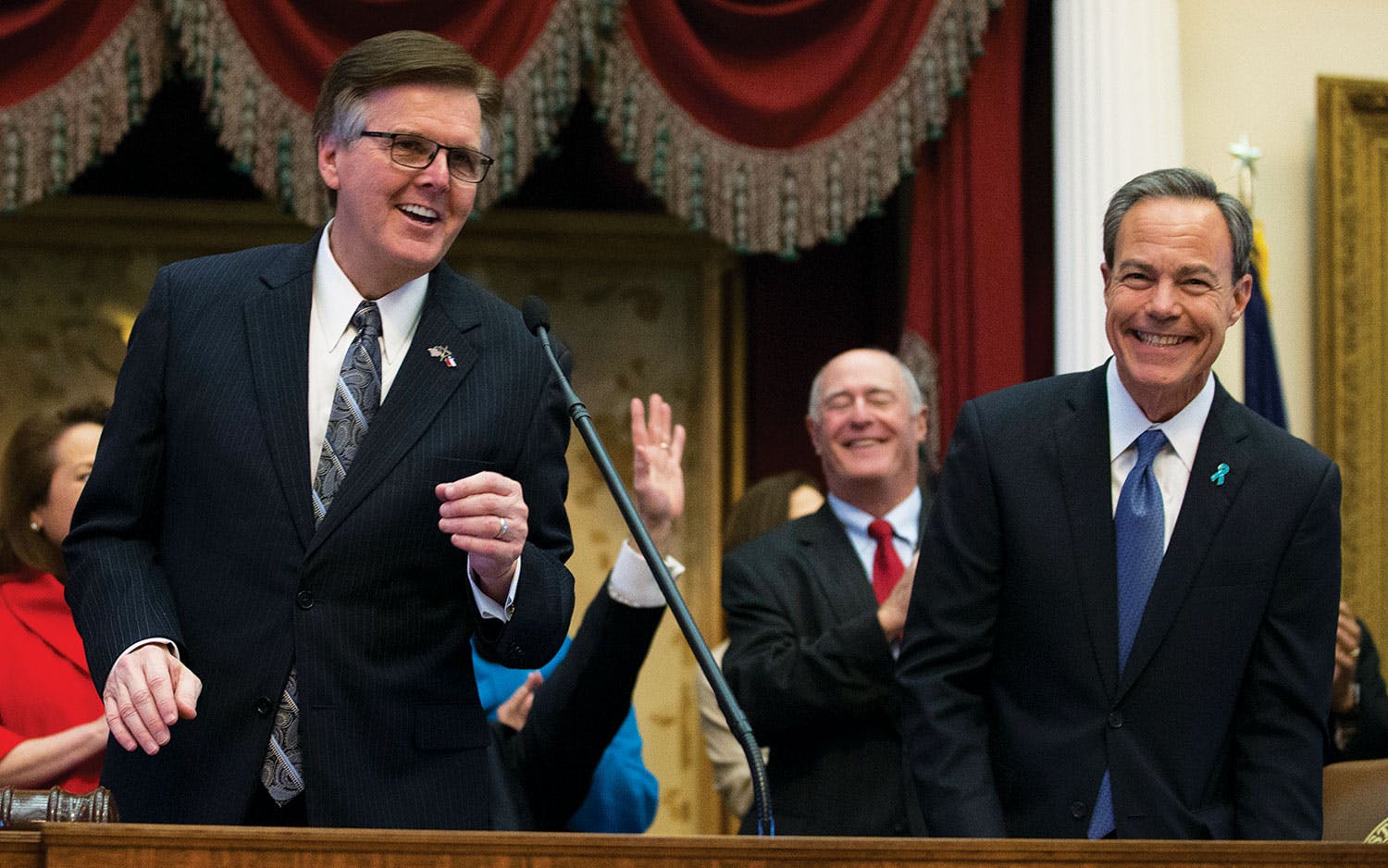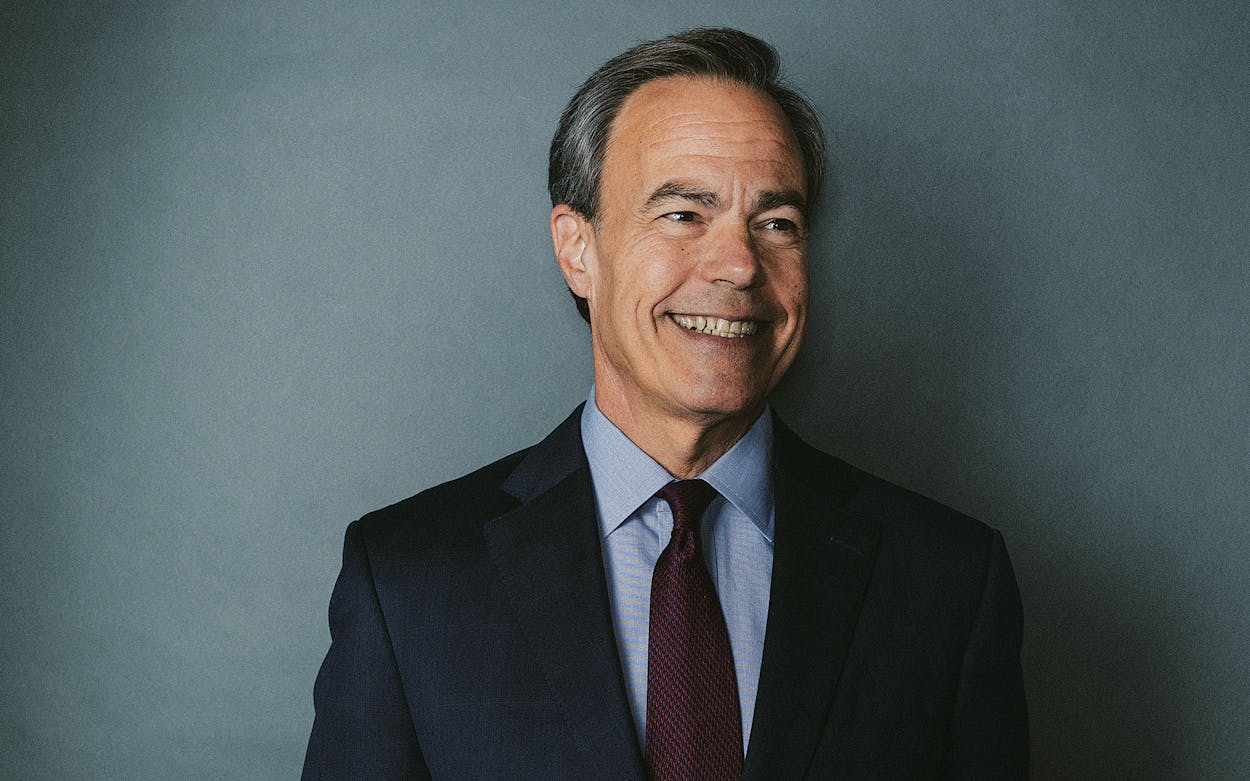This story originally appeared in the December 2017 issue with the headline “Giving Up the Gavel.”
Republican state representative Joe Straus, of San Antonio, shocked the world of Texas politics in late October by announcing he would not seek reelection. A fiscal conservative, Straus first took office in the House in 2005, but he came to prominence in 2009, after legislators revolted against the iron-fisted rule of Speaker Tom Craddick. A small group of Republican members and the Democratic minority decided to elect a speaker among themselves and eventually chose Straus. Since then, he has steered the House away from the far right, often angering members of his own party. Soon to be freed from his legislative duties, Straus looks ahead at what’s next for his career.
R. G. Ratcliffe: All year you’ve been saying that you were going to run for reelection. You even had a fundraiser set for November 30. Why the sudden change of heart?
Joe Straus: I finally took the advice that I give other members at the end of a session who are thinking about not coming back. I always tell them to go home and spend some time with their families and their communities or whatever their involvements are, and think hard about the commitment they’re making. And I did it myself. It was the first time since 2005 that I’d really given serious thought to what I wanted to do next, as opposed to going from the campaign cycle immediately into the governing cycle and then immediately [back] into the campaign cycle. And I determined that I don’t want to be one of those guys who just hangs around forever because he can. I think what we’ve built in the House is sustainable. And I’m excited about what the future opportunities are.
RGR: And those would be . . . ?
JS: There’s been a lot of encouragement for me to run for a statewide office, which I may do at some point. I don’t think there’s a lot of time before the 2018 cycle gets really hot to do that. But I’m encouraged by the support that I’ve received. I think there’s an appreciation for leadership in this state that focuses on substantive issues. And I feel that there’s been disappointment that [some of] the agenda has been small and petty, and not focused on trying to get more people engaged. Whatever platform I move to next, it’s something I plan to address.

RGR: Would you be more interested in governor, or if John Cornyn did not seek reelection, in the U.S. Senate?
JS: I don’t think either of those in the immediate future is viable. I support Senator Cornyn very strongly, and I know that he’s running again. If I can contribute more in an elective office in the future, I would be open to that.
RGR: When you made your announcement, a lot of businesspeople, and Democrats and more-traditional Republicans, were like, “Oh my gosh, here goes the last adult in the room.”
JS: Well, I’m flattered by that kind of attention. I think that some of that fear of the unknown in the future is overstated. I also think that putting too much on one person is probably not accurate. No one person can do anything in this system. It may appear that way at times, but the reason that I’ve had some success in the House over five terms as speaker is because the large majority of members on the floor support what I’m trying to do and they agree with it. It’s not because I’ve imposed my will on them.
RGR: You have said that it was a myth that a candidate has to be crazy to win in the Republican primary. How do you define the crazy aspects that do exist in the Republican primary system, and why is it so dominated by a few groups?
JS: Because certain people want to keep our primaries as small as possible. They want to turn off mainstream people. And they’ve done a pretty effective job at it. That’s a shame. Until our primaries become a larger affair, we’re going to have these squabbles. And we’re going to have the magnification of fringe candidates. More than you would if more people would take the time to vote.
RGR: Those fringe groups, are they promoting things that are realistic, though minor, issues? Or are they just stirring the pot to whip people up?
JS: They’re doing both. And their influence is stronger than it should be. But look at this summer special session, which was largely about the unnecessary bathroom bill. The business community, certain faith leaders—a lot of them—first responders, and educators came together in an organized fashion. The bullying of these fringe groups couldn’t go toe-to-toe with them. It wasn’t even a close fight.
RGR: You’ve traditionally had a weekly breakfast with the governor and the lieutenant governor, and those sort of petered out this session. In the regular session, we had Governor Abbott coming in right at the end to demand changes in the budget. So I have to ask, have Abbott and Lieutenant Governor Patrick been dealing with you honestly and in good faith over the past couple of years?
JS: Honestly, sure. Our breakfast meetings weren’t terribly productive—they were pleasant enough. But we’re all busy people, and at a certain time during the session they became less and less frequent. But we can talk anytime. And it’s better when we do. But when we do, we should have something substantive to talk about.
RGR: Could you run for lieutenant governor?
JS: Have you taken a look at the Senate lately? (Laughs.) I have friends in the Senate, but I have a lot more friends in the House. If I wanted to come back to the Legislature in 2019, I would do it right here, where my good friends are and where I have a really good team and a really good program in place. So that’s not in the cards.
This interview has been edited for clarity and length.
- More About:
- Politics & Policy







